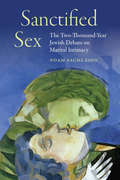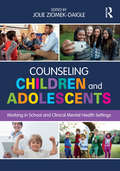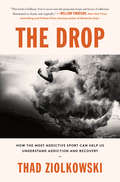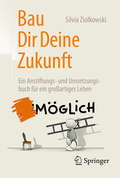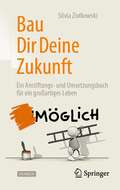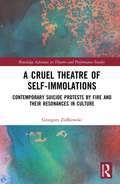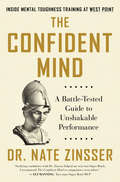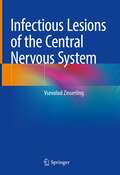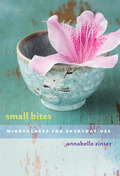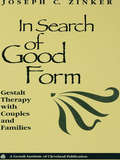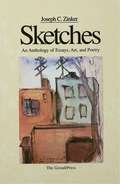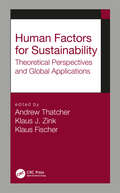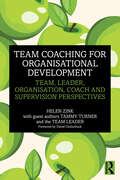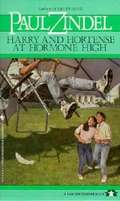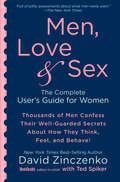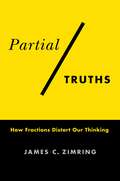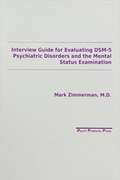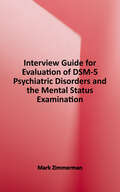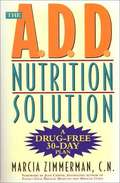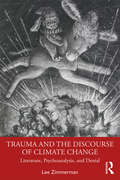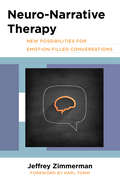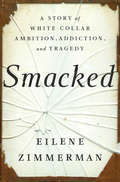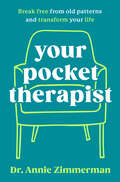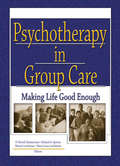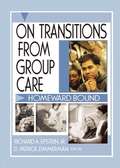- Table View
- List View
Sanctified Sex: The Two-Thousand-Year Jewish Debate on Marital Intimacy
by Noam Sachs ZionSanctified Sex draws on two thousand years of rabbinic debates addressing competing aspirations for loving intimacy, passionate sexual union, and sanctity in marriage. What can Judaism contribute to our struggles to nurture love relationships? What halakhic precedents are relevant, and how are rulings changing? The rabbis, of course, seldom agree. Underlying their arguments are perennial debates: What kind of marital sex qualifies as ideal—sacred self-control of sexual desire or the holiness found in emotional and erotic intimacy? Is intercourse degrading in its physicality or the highest act of spiritual/mystical union? And should women or men (or both) wield ultimate say about what transpires in bed? Noam Sachs Zion guides us chronologically and steadily through fraught terrain: seminal biblical texts and their Talmudic interpretations; Talmud tales of three unusual rabbis and their marital bedrooms; medieval codifiers and mystical commentators; ultra-Orthodox rabbis clashing with one another over radically divergent ideals; and, finally, contemporary rabbis of varied denominations wrestling with modern transformations in erotic lifestyles and values. Invited into these sanctified and often sexually explicit discussions with our ancestors and contemporaries, we encounter innovative Jewish teachings on marital intimacy, ardent lovemaking techniques, and the art of couple communication vital for matrimonial success.
Counseling Children and Adolescents: Working in School and Clinical Mental Health Settings
by Jolie Ziomek-DaigleCounseling Children and Adolescents gives students the information they need to prepare for work in both school and clinical mental health settings (two CACREP—Council for Accreditation of Counseling and Related Educational Programs—specialty areas). This text includes not only content related to developmental and counseling theories but also information on evidence-based practices across the continuum of care, diagnosis and treatment of youth, and current trends such as integrated care, mindfulness, and neuroscience. Unique to this book are sections on both the instructional and behavioral Response to Intervention (RtI) model and PBIS, examples of evidence-based practices used across settings such as Student Success Skills, Check & Connect, and trauma-focused CBT, and a review of common mental health-related disorders most often seen in youth and treatment recommendations. Ethical and legal implications are infused throughout the book, as are CACREP learning outcomes. Instructors using this textbook can also turn to its companion website to access test questions for each chapter. Expansive and practical, Counseling Children and Adolescents fills a gap in counselor preparation programs and provides an important resource that can be used across specialty areas and coursework.
The Drop: How the Most Addictive Sport Can Help Us Understand Addiction and Recovery
by Thad ZiolkowskiIn this revelatory and original book, award-winning author of the acclaimed surf memoir On a Wave illuminates the connection between waves, addiction, and recovery, exploring what surfing can teach us about the powerful undertow of addictive behaviors and the ways to swim free of them.Addiction is arguably the dominant feature of contemporary life: sex, gambling, exercise, eating, shopping, Internet use—there's virtually no pleasurable activity that can't morph into a destructive obsession. For Americans under the age of fifty-five, the leading cause of death is drug overdose. But there is another side of addiction.In some instances, the very activities that can lead to addiction can also lead out of it. As neurologists have recently discovered, surfing is a kind of study in the mechanism of addiction, delivering dopamine to the "pleasure" center of the brain and reshaping priorities and desire in a feedback loop of narrowing focus. Thad Ziolkowski knows this dynamic intimately. A lifelong surfer, he has been surrounded by addiction since his boyhood. In this unique, groundbreaking book, part addiction memoir, part sociological study, part spiritual odyssey, Ziolkowski dismantles the myth of surfing as a radiantly wholesome lifestyle immune to the darker temptations of the culture and discovers among the rubble a new way to understand and ultimately overcome addiction. Combining his own story with insights from scientists, progressive thinkers and the experiences of top surfers and addicts from around the world, Ziolkowski shows how getting on a board and catching a wave is a unique and deeply instructive means of riding out of the darkness and back into the light. Yet while surfing is his salvation, its lessons can applied to other activities that can pull us free from the lethal undertow of addiction and save lives.
Bau Dir Deine Zukunft: Ein Anstiftungs- und Umsetzungsbuch für ein großartiges Leben
by Silvia ZiolkowskiDieses Anstiftungs- und Umsetzungsbuch l#65533;dt Sie ein, sich ausf#65533;hrlich und sehr fokussiert mit den Themen Vision und Zukunft zu befassen. Es geht um Ihr eigenes "Warum?" und ein neues Lebenszuhause, in dem Sie k#65533;nftig wohnen wollen und werden. Das Fundament bilden Ihre Einstellungen und #65533;berzeugungen: ,,Seien Sie beseelt genug, um an Ihre Vision zu glauben, und bekloppt genug, um die Gegenwart zu #65533;ndern, damit sie wahr wird. " Das Buch nimmt dem schillernden Begriff Vision den Schrecken und stellt eine wirkungsvolle Methode der Lebensplanung vor: das Zukunftshaus#65533;. Dabei geht es um ein einfaches, sehr klares Konzept. Dreizehn Interviews unterstreichen, dass dieser Ansatz funktioniert. Sie zeigen, dass Lebenswege selten gerade sind und machen Ihnen Mut, Ihre eigenen Wege zu finden - und zu beschreiten. Die Interviewpartner: Sabine Asgodom - Mike Fischer - Bianca Fuhrmann - Dieter H#65533;rthe - Antje Heimsoeth - Dr. Christoph Heinen - Wiestaw Kramski - Svea Kuschel - Stephan Landsiedel - Christine Lassen - Matthias H. Lehner - Andreas Nau - Anke Wirnsperger
Bau Dir Deine Zukunft: Ein Anstiftungs- und Umsetzungsbuch für ein großartiges Leben
by Silvia ZiolkowskiDieses Anstiftungs- und Umsetzungsbuch lädt Sie ein, sich sehr fokussiert mit Ihrer Wunschzukunft zu befassen. Es geht um Ihr eigenes „Warum?" und ein neues Lebenszuhause, in dem Sie künftig wohnen wollen und werden. Statten Sie Ihr Leben mit viel Energie und ein wenig Magie aus: „Seien Sie beseelt genug, um an Ihre Vision zu glauben, und bekloppt genug, um die Gegenwart zu ändern, damit sie wahr wird.“Dieses Buch nimmt dem schillernden Begriff Vision den Schrecken und stellt eine wirkungsvolle Methode der Lebensplanung vor: das Zukunftshaus®. 13 Interviews unterstreichen, dass dieses klare Konzept funktioniert. Sie zeigen, dass Lebenswege selten gerade sind und machen Ihnen Mut, Ihre eigenen Wege zu finden - und zu beschreiten. Die überarbeitete 2. Auflage wurde um einen nützlichen Werkzeugkasten mit Online-Tools und Übungen für Ihr Zukunftsmuskeltraining ergänzt. Sabine Asgodom - Mike Fischer - Bianca Fuhrmann - Dieter Härthe - Antje Heimsoeth - Dr. Christoph Heinen - Wiestaw Kramski - Svea Kuschel - Stephan Landsiedel - Christine Lassen - Matthias H. Lehner - Andreas Nau - Anke Wirnsperger
A Cruel Theatre of Self-Immolations: Contemporary Suicide Protests by Fire and Their Resonances in Culture (Routledge Advances in Theatre & Performance Studies)
by Grzegorz ZiółkowskiA Cruel Theatre of Self-Immolations investigates contemporary protest self-burnings and their echoes across culture. The book provides a conceptual frame for the phenomenon and an annotated, comprehensive timeline of suicide protests by fire, supplemented with notes on artworks inspired by or devoted to individual cases. The core of the publication consists of six case studies of these ultimate acts, augmented with analyses and interpretations hailing from the visual arts, film, theatre, architecture, and literature. By examining responses to these events within an interdisciplinary frame, Ziółkowski highlights the phenomenon’s global reach and creates a broad, yet in-depth, exploration of the problems that most often prompt these self-burnings, such as religious discrimination and harassment, war and its horrors, the brutality and indoctrination of authoritarian regimes and the apathy they produce, as well as the exploitation of the so-called "subalterns" and their exclusion from mainstream economic systems. Of interest to scholars from an array of fields, from theatre and performance, to visual art, to religion and politics, A Cruel Theatre of Self-Immolations offers a unique look at voluntary, demonstrative, and radical performances of shock and subversion.
The Confident Mind: A Battle-Tested Guide to Unshakable Performance
by Dr. Nate ZinsserBelieve and be unshakable.The Director of West Point’s influential Performance Psychology Program shares the secrets of mental toughness and self-belief in this definitive guide to mastering confidence, the key to performance in any field.Dr. Nate Zinsser has spent his career training the minds of the U.S. Military Academy’s cadets as they prepare to lead and perform when the stakes are the very highest—on the battlefield. Alongside this work, he has coached world-class athletes including a Super Bowl MVP, numerous Olympic medalists, professional ballerinas, NHL All-Stars, and college All-Americans, teaching them to overcome pressure and succeed on the biggest stages.Dr. Zinsser has come to understand that one single trait above all others makes peak performance possible: confidence, or the belief in oneself. Whether your mission involves leading a platoon into combat, returning an opponent’s serve, or delivering a sales pitch to a roomful of skeptical prospects, you perform best when you are so certain about your abilities that your flow of fear, doubts, and confusion slows to the barest minimum. What’s more, Dr. Zinsser has come to understand that confidence is a skill that can be taught, improved, and applied by anyone to enhance nearly every aspect of our lives and careers.Now, for the first time, Dr. Zinsser distills his research and years of experience, offering a fascinating guide to the science of confidence and providing readers with a practical, step-by-step program to best harness their belief in themselves to achieve success in any field. The Confident Mind is a complete guide to confidence: how to understand it, how to build it, how to protect it, and how to rely upon it when your performance matters most.
Infectious Lesions of the Central Nervous System
by Vsevolod ZinserlingThis book discusses all aspects infectious CNS pathology, including different bacterial, viral, fungal, mycoplasma and protozoan pathogens, accompanied by illustrations that show macro- and histopathological changes. It also presents microbiological, epidemiological and clinical data, with a particular focus on meningitis and encephalitis of different bacterial and viral aetiologies, influenza, COVID-19 and other viral and bacterial generalized infections. Further, the book explores the importance of mixed infections, including those in the late stages of HIV infection, as well as pathological changes in different age groups including newborns. A special chapter is devoted to the probable role of biological pathogens in noninfectious brain pathology.
Small Bites: Mindfulness for Everyday Use
by Annabelle ZinserDrawing on her experiences as a Buddhist teacher in the tradition of Thich Nhat Hanh, Annabelle Zinser developed meditation and mindfulness practices for a variety of everyday situations and the transformation of emotional challenges. In short chapters the author demonstrates how to connect the awareness of our breath with focusing our mindfulness on a particular topic at hand, such as: dealing with inferiority complex; recognizing negative thoughts and emotions; taking care of our sexuality; seeing our ancestors within us. This puts us in touch with the healing capacity of the present moment, and gives us a tool to transform even the most difficult and painful aspects of our lives into something joyful and healing. In their simplicity, the meditations follow the model of Metta meditation, aiming for the cultivation of our hearts and spirits. They always begin with focusing on the breath but from there expand to addressing a broad spectrum of mental conditions and life situations.Written for anyone aiming to living in a more grounded and sustainable way, Small Bites offers immediately applicable guidance in applying key mindfulness practices to daily life.
In Search of Good Form: Gestalt Therapy with Couples and Families
by Joseph C. ZinkerWith In Search of Good Form, Joseph Zinker emphasizes seeing and being with as keys to a phenomenological approach in which therapist and patient co-create and mutually articulate their own experiences and meanings. He considers Gestalt field theory, the Gestalt interactive cycle, and Gestalt concepts.
Sketches: An Anthology of Essays
by Joseph C. ZinkerTo all of those familiar with the Gestalt model and its many creative extensions and applications, the name Joseph Zinker needs no introduction. A master Gestalt therapist and a cofounder of the Gestalt Institute of Cleveland, Joseph trained with Fritz Perls in the 1960's and has been influential in the growth and development of Gestalt theory and methodology for over three decades. His groundbreaking 1976 book, Creative Process in Gestalt Therapy, remains a best-seller and classic. It eloquently presents his unique contributions to the Gestalt method including dreamwork as theater, the choreography of expressive movement, experiment, and application of the arts to psychotherapy. In his most recent book, In Search of Good Form: Gestalt Therapy with Couples and Families, (Analytic Press, 1998) Joseph inspires a return to Gestalt therapy with couples and families, Joseph inspires a return to Gestalt therapy's roots in humanism, holism, and faith in the creative power of growth and integration that resides in each of us. Aside from his books, he has published many articles on psychotherapy, the arts, and the phenomenology of love. In recent years his focus has been on the development of couple and family therapy. He now leads workshops around the world and is well know as an engaging teacher, helping and inspiring therapists and lay people alike. Joseph has experienced drama and struggle in his rich life, resulting in a deep compassion for his fellow man. He is seen as lively and creative, at times funny, at others deeply moving as he lovingly reaches out to workshop participants.
Human Factors for Sustainability: Theoretical Perspectives and Global Applications
by Klaus J. Zink Andrew Thatcher Klaus FischerThis book deals with the central question of how human factors and ergonomics (HFE) might contribute to solutions for the more sustainable development of our world. The contents of the book are highly compatible with the recent political agenda for sustainable development as well as with sustainability research from other disciplines. <P><P>The book aims to summarize and profile the various empirical and theoretical work arising from the field of “Human Factors and Sustainable Development” in the last decade. The book gives a systematic overview of relevant theoretical concepts, their underlying philosophies, as well as global application fields and case studies.
Team Coaching for Organisational Development: Team, Leader, Organisation, Coach and Supervision Perspectives
by Helen ZinkWorking with teams, leading teams and being a member of a team is part of everyday working life for most of us. Through the lens of a team coaching case study, this book considers the development journey of a team and system influences over a three-year period. Readers are invited to walk in the shoes of the team, the team leader, the organisation, the team coach and the coach’s supervision and support networks, providing a unique insight into team coaching and development that goes beyond the traditional focus on the coach’s perspective. Helen Zink uses her considerable experience as a leadership and team growth coach, and leader to illustrate how team coaching interventions can be combined with other disciplines such as positive psychology, change management and strategic implementation in effective ways. The book takes a pracademic approach, showing how theories, models and best practice are applied to a real case and highlighting both the successes and challenges experienced to offer an example for all those involved in team, leadership and organisational development. With it widely recognised that collective leadership and teamwork is needed to deal with the rapidly changing environment organisations find themselves in, this is a timely and important resource for coaches, team coaches, coach supervisors, team leaders, team members, organisational development specialists, change managers, academics and consultants.
Harry and Hortense at Hormone High
by Paul ZindelSophomores Harry and Hortense are convinced they're the only enlightened people in their messed-up, miserable high school, which Harry's nicknamed Hormone High.
Men, Love & Sex: The Complete User's Guide for Women
by David Zinczenko Ted SpikerIn this funny and fascinating guide for women, thousands of men confess what turns them on, what turns them off, and what turns "for now" into "forever."With shocking and never-before seen statistics and powerful confessions, Men's Health editor-in-chief David Zinczenko presents a funny and fascinating guide for women into the inner workings of the male mind. Here, in Men, Love & Sex, the most perplexing questions that women have about guys and relationships are finally answered. Men give their frank and honest thoughts to such questions as: -How will you know when he's in love?-What's really wrong when he says "nothing"?-How can you get him to kiss you more (and longer)?-How badly did his ex mess him up?-How can you get him to open up?-What does he crave in the bedroom more than anything else?-What drives him to end a relationship?-What are the best ways to keep him from cheating?-Why does he always miss the toilet?Men's brains, feelings, and actions can be harder to interpret than abstract art. So let Men, Love & Sex become your guide to navigating a relationship through all of its stages. Once you know the secrets to the male mind, you'll be able to bridge the communication gaps that divide men and women. You'll be able to strengthen the relationship you have now--or use your new insights to find the perfect man for you. In the end, you'll get better talks, better sex, better fighting, better understanding, better love, better relationships, and a better life.For the both of you.
Partial Truths: How Fractions Distort Our Thinking
by James C. ZimringA fast-food chain once tried to compete with McDonald’s quarter-pounder by introducing a third-pound hamburger—only for it to flop when consumers thought a third pound was less than a quarter pound because three is less than four. Separately, a rash of suicides by teenagers who played Dungeons and Dragons caused a panic in parents and the media. They thought D&D was causing teenage suicides—when in fact teenage D&D players died by suicide at a much lower rate than the national average. Errors of this type can be found from antiquity to the present, from the Peloponnesian War to the COVID-19 pandemic. How and why do we keep falling into these traps?James C. Zimring argues that many of the mistakes that the human mind consistently makes boil down to misperceiving fractions. We see slews of statistics that are essentially fractions, such as percentages, probabilities, frequencies, and rates, and we tend to misinterpret them. Sometimes bad actors manipulate us by cherry-picking data or distorting how information is presented; other times, sloppy communicators inadvertently mislead us. In many cases, we fool ourselves and have only our own minds to blame. Zimring also explores the counterintuitive reason that these flaws might benefit us, demonstrating that individual error can be highly advantageous to problem solving by groups. Blending key scientific research in cognitive psychology with accessible real-life examples, Partial Truths helps readers spot the fallacies lurking in everyday information, from politics to the criminal justice system, from religion to science, from business strategies to New Age culture.
Interview Guide for Evaluating DSM-5 Psychiatric Disorders and the Mental Status Examination
by Mark Zimmerman<p>This book provides questions for evaluating psychiatric disorders. DSM-5 lists the disorders and their criteria, but it does not guide the beginner in inquiry for them. Students and clinicians in training are relatively unfamiliar with psychiatric diagnoses, and they cannot possibly remember all of the disorders and their corresponding diagnostic criteria within a short period of study. Moreover, it is often not obvious what questions to ask to determine the symptom's presence. How do you inquire for thought withdrawal, delusions of reference, panic attacks, obsessions, identity disturbance, mood instability, etc? Even more basic, how do you begin the interview? <p>The Interview Guide consists of questions for the most common DSM-5 diagnoses including the personality disorders. This book is not a standardized interview, to be started on page x and followed until page xx. Rather it is a quick reference to be used in the context of a clinical interview. If a patient complains of depression, the interviewer can turn to the section on major depression and assess the relevant symptoms. If there is a suggestion of excessive drug or alcohol use, the interviewer can refer to the long list of questions for diagnosing a drug or alcohol use disorder.</p>
Interview Guide For Evaluating DSM-5-TR Psychiatric Disorders and the Mental Status Examination
by Mark ZimmermanThis book provides questions for evaluating psychiatric disorders. DSM-5-TR lists the disorders and their criteria, but it does not guide the beginner in inquiry for them. Students and clinicians in training are relatively unfamiliar with psychiatric diagnoses, and they cannot possibly remember all of the disorders and their corresponding diagnostic criteria within a short period of study. Moreover, it is often not obvious what questions to ask to determine the symptom's presence. How do you inquire for thought withdrawal, delusions of reference, panic attacks, obsessions, identity disturbance, mood instability, etc., Even more basic, how do you begin the interview? The Interview Guide consists of questions for the most common DSM-5 diagnoses including personality disorders. This book is not a standardized interview, to be started on page x and followed until page xx. Rather it is a quick reference to be used in the context of a clinical interview. If a patient complains of depression, the interviewer can turn to the section on major depression and assess the relevant symptoms. The book is organized by diagnosis and contains 9 sections.
The A. D. D. Nutrition Solution: A Drug-Free Thirty-Day Plan
by Marcia ZimmermanThe first scientifically proven, effective, all-natural nutritional alternative to the much-prescribed drug Ritalin. Attention deficit disorder is a nutritional deficiency, not a psychological condition. This is the revolutionary discovery Marcia Zimmerman made during her ten years of research as a nutritional biochemist. That conclusion led her to develop a diet that addresses the specific needs of the 17 million adults and children suffering from ADD. Her easy-to-follow thirty-day plan has been proven just as effective as Ritalin in relieving the symptoms of ADD. Learn: - How women should boost their nutrition before conception to prevent ADD in their children. - Why boys are much likelier to be tagged as ADD than girls - How to get a reliable ADD diagnosis Reasons why parents prefer a diet plan to prescription drugs for ADD children - The effects of brain allergies on attention span - Foods to avoid that may exacerbate ADD - Fats and oils we all need to stay focused - Calming effects of carbohydrates - Concentration-enhancing protein - Why to stay away from simple sugars - The dangers of artificial food ingredients, and much more This important book will help us curb the epidemic growth of ADD in this country and change the way we treat those who have it now by addressing its source instead of merely treating its symptoms.
Trauma and the Discourse of Climate Change: Literature, Psychoanalysis and Denial
by Lee ZimmermanThe more the global north has learned about the existential threat of climate change, the faster it has emitted greenhouse gases into the atmosphere. In Trauma and the Discourse of Climate Change, Lee Zimmerman thinks about why this is by examining how "climate change" has been discursively constructed, tracing how the ways we talk and write about climate change have worked to normalize a generalized, bipartisan denialism more profound than that of the overt "denialists." Suggesting that we understand that normalized denial as a form of cultural trauma, the book explores how the dominant ways of figuring knowledge about global warming disarticulate that knowledge from the trauma those figurations both represent and reproduce, and by which they remain inhabited and haunted. Its early chapters consider that process in representations of climate change across a range of disciplines and throughout the public sphere, including Al Gore’s An Inconvenient Truth, Barack Obama’s speeches and climate plans, and the 2015 Paris Agreement. Later chapters focus on how literary representations especially, for the most part, participate in such disarticulations, and to how, in grappling with the representational difficulties at the climate crisis’s heart, some works of fiction—among them Cormac McCarthy’s The Road and Russell Hoban’s Riddley Walker—work against that normalized rhetorical violence. The book closes with a meditation centered on the dream of the burning child Freud sketches in The Interpretation of Dreams. Highlighting the existential stakes of the ways we think and write about the climate, Trauma and the Discourse of Climate Change aims to offer an unfamiliar place from which to engage the astonishing quiescence of our ecocidal present. This book will be essential reading for academics and students of psychoanalysis, environmental humanities, trauma studies, literature, and environmental studies, as well as activists and others drawn to thinking about the climate crisis.
Neuro-Narrative Therapy: New Possibilities For Emotion-filled Conversations
by Jeffrey ZimmermanBringing interpersonal neurobiology and narrative therapy together. Narrative therapy understands storytelling as the way we make sense of ourselves and life experience. Many non-narrative therapists have expressed great admiration and interests in the politics the work exposes, the way it brings in the socio-political context, and the way it centers clients. Yet despite its popularity and success as a useful therapeutic approach, Narrative Therapy has been criticized as minimizing and failing to develop any extended discussion of something vital to our lives: emotion. Neuro-Narrative Therapy attempts to redress this problem by taking us first through standard Narrative practices, and then showing how and where affect can be brought in and even privileged in the work. After situating the evolution of Narrative Therapy in its historical context, the book provides information about why emotions should be given an important place in the work. Specifically, it brings ideas and implications of some of the most exciting and novel theories—interpersonal neurobiology and affective neuroscience—to the practice of Narrative Therapy. Readers will learn about the growing emphasis on the right brain, and how an understanding of the ways in which emotion and affect are manifested by the brain can help us help our clients. The possibilities for this new approach are many: a freer discussion of the emotional side of your clients; an understanding and sensitivity to the relation of body and mind; attention to how the therapeutic relationship of our clients can become a resource in treatment and a renewed understanding of how our memories—and thus our stories about our lives—develop in early childhood and beyond. For any therapist working in the area of Narrative Therapy, and for any interested in the emerging understandings that science is bringing to appreciating how our brains develop with and among each other, this book has something to offer. Combining the neuro- and the narrative, as Jeffrey Zimmerman has done here, will create a new direction in Narrative Therapy, one in which our brain and body work together, inviting a more direct and effective engagement with clients.
Smacked: A Story of White-Collar Ambition, Addiction, and Tragedy
by Eilene ZimmermanA journalist pieces together the mysteries surrounding her ex-husband’s descent into drug addiction while trying to rebuild a life for her family, taking readers on an intimate journey into the world of white-collar drug abuse. <P><P>Eilene Zimmerman noticed that her ex-husband looked thin, seemed distracted, and was frequently absent from activities with their children. She thought he looked sick and needed to see a doctor, and indeed, he told her he had been diagnosed with an autoimmune disorder. Yet in many ways, Peter seemed to have it all: a beautiful house by the beach, expensive cars, and other luxuries that came with an affluent life. Eilene assumed his odd behavior was due to stress and overwork—he was a senior partner at a prominent law firm and had been working more than sixty hours a week for the last twenty years. <P><P>Although they were divorced, Eilene and Peter had been partners and friends for decades, so when she and her children were unable to reach Peter for several days, Eilene went to his house to see if he was OK. <P><P>So begins Smacked, a brilliant and moving memoir of Eilene’s shocking discovery, one that sets her on a journey to find out how a man she knew for nearly thirty years became a drug addict, hiding it so well that neither she nor anyone else in his life suspected what was happening. Eilene discovers that Peter led a secret life, one that started with pills and ended with opioids, cocaine, and methamphetamine. He was also addicted to work; the last call Peter ever made was to dial in to a conference call. <P><P>Eilene is determined to learn all she can about Peter’s hidden life, and also about drug addiction among ambitious, high-achieving professionals like him. Through extensive research and interviews, she presents a picture of drug dependence today in that moneyed, upwardly mobile world. She also embarks on a journey to re-create her life in the wake of loss, both of the person—and the relationship—that profoundly defined the woman she had become.
Your Pocket Therapist: Break Free from Old Patterns and Transform Your Life
by Dr. Annie ZimmermanFrom psychotherapist and TikTok personality Dr. Annie Zimmerman comes a toolkit to transform yourself and your relationships, with advice on how to heal past trauma, build sustainable connections, and take ownership of your mental health.Every day, psychotherapist Dr. Annie Zimmerman meets clients in her private London practice who are struggling with their lives. They’re committed to achieving personal growth, making changes—but they’re struck at the question stage. They ask her: Why can’t I sleep? Why do I keep going back to a bad relationship? Why did I lose my temper? What is wrong with me?Here’s the thing: nothing is wrong with them. It’s just that they’re asking themselves the wrong questions.In Your Pocket Therapist, Dr. Zimmerman helps readers delve into their past to identify old, unhelpful patterns and teach them how to unlock the present. The book combines practical tools with anecdotes gleaned from the therapy room, distilling complex psychological concepts with her signature warmth and empathy. Her belief—galvanized by her hundreds of thousands of followers—is that if we learn to understand the roots of our suffering, we can bring about meaningful—and permanent—change in our lives. It comes down to learning how to ask the right questions.A brilliant, necessary toolkit for those who want to break free from past patterns and embrace a life of abundant self-awareness and connection, Your Pocket Therapist is an absolute must-read in the field of psychology.
Psychotherapy in Group Care: Making Life Good Enough
by D Patrick Zimmerman Richard A. Epstein Jr Martin Leichtman Maria LeichtmanIntegrate psychotherapy with residential treatment to achieve positive results for patients in group care! This book addresses the complex issues that arise in the effort to provide individual therapy in group care settings. It reviews classical case material, presents contemporary case studies, and examines practical and theoretical issues important to the effective delivery of treatment to individuals living in residential care. Noted experts who have been associated with The Sonia Shankman Orthogenic School at the University of Chicago and the Menninger Clinic in Topeka, Kansas, share knowledge garnered from years of real-world experience to help you stay at the leading edge of the field and provide effective individual treatment to your clients in long- and short-term residential care. Psychotherapy in Group Care: Making Life Good Enough includes practical and theoretical chapters exploring important aspects of the group care paradigm. The book: presents a case study that describes vital aspects of the analytic process that emerged in work with an adolescent boy in a group home who felt as though he was a psychological orphan illustrates the role of play as a continuous and basic function in therapy and presents play-themed vignettes from analytic work with two young people in residential care revisits "Joey: A Mechanical Boy" and "Tommy the Space Child"-classic case studies from Bruno Bettelheim and Rudolph Ekstien-and explores the implications of contemporary relational theory for using the meaning and metaphor of behaviors and communications addresses issues of transference and counter-transference in the psychodynamic psychotherapy of a young girl in residential care-with a discussion of unrecognized rescue fantasies and projective identification, and of the need for residential childcare workers to recognize and work through the difficult feelings evoked in the process of working with seriously disturbed young people examines the structural basis for the integration of psychotherapy and residential treatment, considering the meaning of integration, variables that affect the manner and degree to which integration can be accomplished, and changes in the psychotherapists' roles that can maximize the potential of each variable explores three sets of theoretical issues facing clinicians as they play multiple roles in short-term residential treatment, discussing how conflicts in the roles of therapists and team leaders can be resolved, the implications of such a resolution in terms of confidentiality, and ways in which major approaches to psychotherapy can be adapted to new conditions considers the role of the primary clinician in relation to the residential team and explores the ways in which integration of psychotherapy and residential treatment can be implemented in the early phase of the treatment process
On Transitions From Group Care: Homeward Bound
by D Patrick Zimmerman Richard A. Epstein JrExamine ways to help prepare young people for a successful transition from group care to community living! How can we best help young people in residential care settings prepare for life "on the outside?" The editors of On Transitions From Group Care: Homeward Bound are devoted to helping answer the question of how providers of residential treatment services can improve the transition process when children in their care are transferred to less restrictive situations. Chapters focus on the challenges of this process when working with sexually aggressive youth, adolescents with behavioral or conduct disorders, and the families of young people in residential care facilities. You'll learn about model transitional living programs, ways to integrate family work into residential care, and programs that focus on social/life-skills training. On Transitions From Group Care: Homeward Bound examines: a program designed to involve parents and caregivers in the residential treatment and transition process for sexually aggressive youth diagnosis and placement variables that affect outcomes for adolescents with behavior disorders in an outpatient mental health clinic the redesigning of an existing residential treatment program to allow parents, caregivers, and the community a much more integral role in each child's residential treatment experience case studies of children who have participated in the transitional living program at Bellefaire/JCB-a large social service agency for children and families in the Cleveland, Ohio area-with both successful and unsuccessful outcomes the role of social skills training programs in facilitating successful transitions from residential treatment to community life
